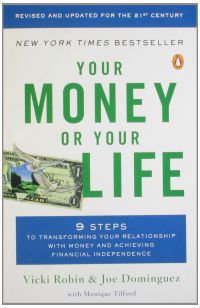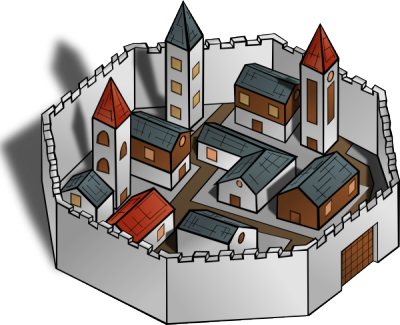
We’re continuing our Frugal Moms² Book Club discussion of Your Money or Your Life by Joe Dominguez and Vicki Robin with Chapter 2: Money Ain’t What it Used to Be and Never Was. I thought this was a powerful, and thought-provoking chapter. It really digs deep into why we do what we do with money.
It opens with a simple question: What is money really?
How do you define it? It’s funny that something as central to our lives as money can be hard to put into words. We spend a lot of time talking about what to do with it, but not what it actually is.
Without a universally and consistently true definition of money, our handling of this substance is anywhere from inept to insane, and almost always incapable of getting us what we think we want. ~Joe Dominguez & Vicki Robin
Rather than give an immediate answer, the book looks at four different levels of viewing money.
The Four Perspectives of Money:
1. Physical (street) view: This is where all of our actual financial transactions exist- our earnings, our purchases, our checking and savings, our stock transactions, this is where money “moves”.

It’s also where our finance woes exist- such as bills and debts; and where we look for solutions through the “more, better and different game”. Unhappy? Buy something. Need more cash? Beg, borrow, steal or make more. But for every solution we come up with, another problem seems to appear out of nowhere. So we continue to rearrange the chess pieces of our lives on the board, hoping to find the “right” combination, but never asking why we’re playing the game in the first place- or if it’s even worth playing.
2. Emotional/Psychological (Neighborhood) view: The is the first non material level of money and the place where we start to see patterns of behavior. It’s the “emotional and mental glue that holds together daily transactions with money”.

It’s also where we see our our “money personalities” at work; the product of being raised in different financial environments. Are you a shopaholic or a penny pincher? Were you brought up to think money was bad? Or that it was so good you couldn’t bear to part with it? Knowing your “financial psychology” is powerful. We all know what we need to do with money, but why don’t we do it? Our financial psychology is why. And it’s so powerful that if we don’t know it, we can never break free of it.
In addition, many people have a “money mythology”. It’s what money means to us, both good and bad. Some of it may be based in superstition or on our upbringing and culture, such as picking up a lucky penny or passing on chain letters guaranteed to “bring you money if you don’t break the chain”. You can see this reflected in the practice of feng shui, where money and colors are positioned in certain areas of the house. Or in some of strange practices of stock brokers on a winning streak (wearing lucky socks, shirts, etc, or repeating certain things they did when they started on a good “streak” of winning trades.)
“We should be aware as we explore these deeper myths that our rational minds may deny what our behavior reveals. We may say we’re not superstitious, but we still walk around ladders. We may say that money is simply bits of paper and metal that we manage either well or poorly, but our actions speak louder than words. We each live in an intricate web of beliefs about these bits of paper and metal.” ~Joe Dominguez & Vicki Robin
Emotional/Pyschological Money Perspectives

A few common perspectives on money are that are tied up in our emotions and psychology are:
1. Money as security– Financial security= emotional security (this one hit close to home for me!) Money as a security blanket (like Linus from the Peanuts cartoon), money as a safety net in case of “bad things happening”. Many tightwads (myself included), homesteaders and preppers might find themselves in this category. (Guilty on all counts here!)
“The hoarding behavior of people who equate money with security runs the gamut from penny-pinching (denying themselves not only luxuries but even downright necessities of life) to addictive interest in bargains (buy now, buy more, buy two) to compulsive saving (the pathological extreme of which involves stashing away sheaves of dollar bills in mattresses and cardboard boxes). For many people, financial security means emotional security.” ~Joe Dominguez & Vicki Robin
2. Money as power– Use of money to manipulate others and hold power over them. Can also be seen as a way to have power (or freedom) to do what you want to do, and when. Many people know others like this, or in my case, were married to one.
3. Money as social acceptance– Money = self worth. Buying your way into “the club”, buying acceptance and even love from others. How many times have we seen this behavior in a neighbor, lover or friend? Or ourselves?
4. Money as evil– The attachment of morality to money. This is taught in many churches, and the intentions are not bad. We’re taught to choose people before money, that there are more important things than money and we shouldn’t worship it. Unfortunately, some people internalize this as money being evil in itself. It’s actually morally neutral. It’s what we do with it that can hurt or help others.
“The notion that money is evil probably stems from the biblical admonition that “the love of money is the root of all evil.” It is our attachment to things over people that pushes us into wrong action. A moment of reflection should be enough for us to see that money doesn’t hurt people— people hurt people.” ~Joe Dominguez & Vicki Robin
What’s Yours?
What’s your money type? Money personality? Money mythology? All of these “types” are just different ways of looking at our complex relationship with money; through personality typing, archetypes, psychology, etc.
“We all have a money personality. Until you become conscious of your own you don’t have a choice about your behavior. You just do it because . . . because . . . that’s the way you always have..” ~Joe Dominguez & Vicki Robin
So the question is: What’s yours?
3. Cultural (city-wide) view: These are the beliefs about money that we agree upon as a culture. Sometimes we’re unaware of these beliefs. When asked why we believe them, our explanation is often because “that’s just the way it is.”

“We live and die by the assumption that money is worth something. Money, the economists tell us, is a “store of value” and a “means of exchange.”” ~Joe Dominguez & Vicki Robin
In reality, money is a human invention and is only a couple of thousand years old. It is only worth something because we have agreed as a culture that it has worth. It’s a convenient way to exchange items without having to count and store livestock, materials and other bulky things. But it only truly has worth because we agree that it does.
The culture we grow up in also has viewpoints we inherit or buy into about money. The “growth is good” mantra that North America and much of the world bases its economies on has also pervaded our personal lives in the pursuit of money.
“These “more is better, growth is good” cultural assumptions also breed in us subtle economic prejudices. We judge our own and others’ importance by material yardsticks— the size of our paychecks, the size of our houses, the size of our portfolios… From the citywide perspective, this informal caste system becomes quite apparent— in others and in ourselves.” ~Joe Dominguez & Vicki Robin
The pursuit of happiness and the pursuit of more are not synonymous. We often equate one with the other and we spend so much time and energy on it, that it’s hard to focus on other parts of our lives that are just as important, such as intellectual, emotional, and spiritual growth. This is further compounded by economic terms that scare us into acceptance and compliance to the cultural viewpoint of money.
These specters— inflation, cost of living, recession and depression— frighten us into adherence to the economic recipe for wellbeing, “growth is good,” and its corollary, the myth of “more is better.” And, like any religion based on fear, this economic creed keeps us bound by our own ignorance..” ~Joe Dominguez & Vicki Robin
So we are told money has worth, that we need lots of it to have worth, and we are scared into buying these cultural beliefs with images of scarcity and external forces beyond our control that may hit at any moment. Are some of these forces real? Yes. Life is crazy and uncertain at times.
And we do have to survive. In our culture, that means we have to interact with money in some way to obtain food, clothing and shelter. But our viewpoints may not be as grounded in reality as we think. Many of our ideas about money are experiences and ideas generated on these first three levels. But there is another level that is totally different and can change our relationship with money profoundly.
4. Personal Responsibility and Transformation (helicopter view): This is place where we can step back from the madness, and realize that we can choose something different. We can transform our relationship with money by realizing we aren’t bound to the beliefs we have bought into on the other levels. It’s a clearer, high view of everything.

“All our false notions about money thus far have one common flaw— they identify money as something external to ourselves. It is something we all too often don’t have, which we struggle to get, and on which we pin our hopes of power, happiness, security, acceptance, success, fulfillment, achievement and personal worth. Money is the master and we the slaves. Money is the victor and we the vanquished.”
It’s powerful programming, and sometimes hard to break free of. But we are not a victim of money or circumstances.
“Money is something we choose to trade our life energy for. Our life energy is our allotment of time here on Earth, the hours of precious life available to us. When we go to our jobs we are trading our life energy for money…Life energy is all we have. It is precious because it is limited and irretrievable. Our choices about how we use it express the meaning and purpose of our time here on earth.” ~Joe Dominguez & Vicki Robin
From the Financial Integrity Guide:
“We spend our life energy in hours on the job in exchange for money. Anyone with a salaried or hourly job fits this description.
~ or ~
We support someone else (who earns money) with our life energy, thereby allowing money to come into our life. (One spouse works part-time in order to watch the kids after school, while the other spouse “trades” for this time by carrying more of the family expenses).
~ or ~
We spend our life energy managing our investments, in exchange for increased dividends or value. Anyone who manages a portfolio or real-estate property fits this description. No matter how we acquire money, we spend some amount of time (life energy) to get it. The amount of life energy may not be the same in every instance, but it is universally true that life energy was traded for money. Money = something we trade our life energy for.”
Ultimately, each of us must decided what money is worth and how we want to spend it. It’s literally our life energy, our limited time on this earth. Do we want to fritter it away on things that don’t matter to impress people we don’t like? Wouldn’t it be more purposeful to know what our life energy costs us and to spend more wisely?
This brings us to Step 2: Being in the Present- Tracking Your Life Energy (this will go live tomorrow)
Discussion Questions:
- What does money mean to you?
- What are your first memories around money?
- What were you taught about it?
- What did money mean to you growing up
- What does money mean to you now?
- Do you feel differently about money having completed the exercises in Step 1?
- What is your money personality?
- What is your money psychology?
- What are some of the things you’re discovering about your money mythology?
- Which of the four common perceptions about money rang true for you (money as security, power, acceptance, evil?)

I found this chapter very profound. It was hard not to quote the entire thing! So many good points, and I couldn’t get them all into the summary. I can’t wait to post Step 2 tomorrow!
Kim 🙂
Good post. I learn something totally new and challenging on blogs I stumbleupon on a daily basis.
It’s always useful to read articles from other writers and use a little something from their websites.